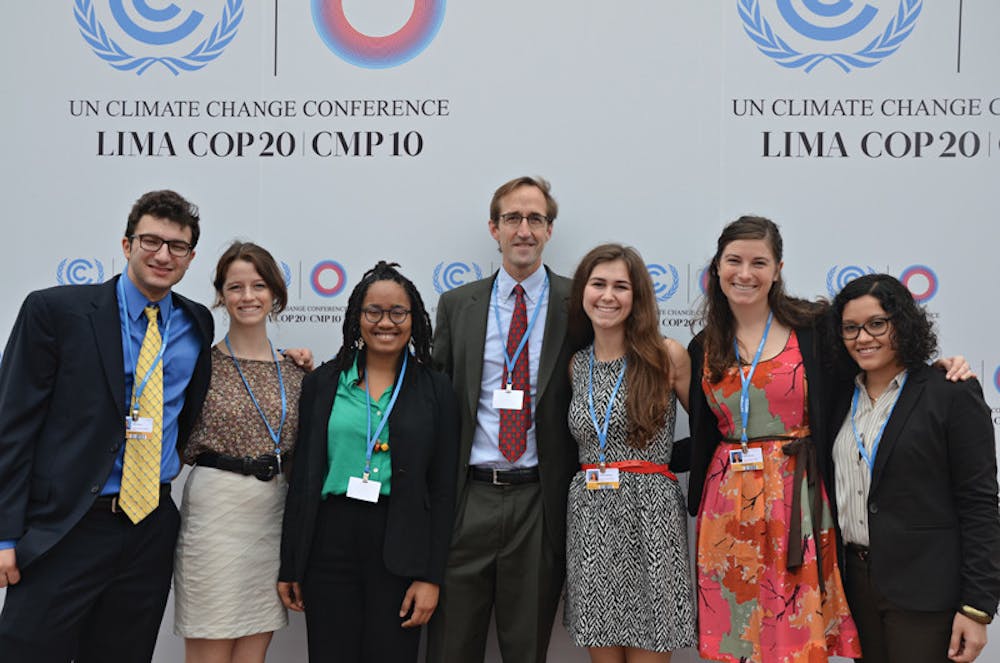Four courses offered in 2015 will feature travel components enabled by the second inaugural Global Experiential Learning and Teaching grants, according to a Jan. 23 University press release.
A total of seven 2015 GELT grants were awarded, marking a slight decrease from last year, when nine grants were bestowed.
The grants are offered by the Office of Global Engagement and provide funding in two stages. In the first phase, faculty members apply for up to $4,000 of funding to develop a course. In the second phase, the University provides up to $35,000 to send 12 students and a professor abroad for a course-related experience.
The only class to have used a GELT grant for travel last year, ENVS 1575: “Engaged Climate Policy at the United Nations Climate Change Talks,” traveled to Lima, Peru, with Professor of Environmental Studies and Sociology J. Timmons Roberts. In Peru, the class attended the UN Framework Convention on Climate Change. Students were able to witness the negotiations first-hand and meet delegates and “NGOs, students, professors and climate change experts from around the world,” Roberts said.
“Thanks to the generosity of GELT, I was able to be in an environment that allowed me to physically sit down across the table from oil company executives and ask them the hard questions that I have been developing throughout my academic experiences at Brown,” said Sophie Purdom ’16, an environmental science concentrator who took the class. She added that traveling allowed her to “engage” with material that is “usually hypothetical or in a textbook.”
Roberts has championed the model of “not just reading texts, but trying to actually talk with the people at the conference and effecting the changes you want to see,” said Alison Kirsch ’15, who also enrolled in the course.
Roberts said when he has taken students to this conference in the past, they spent much of the semester raising funds for the trip. The GELT grant afforded students this year more time and freedom to learn about negotiations and climate change, he added.
While Roberts’ grant is not immediately renewable for future iterations of the course, four other courses received phase two funding.
The proposed courses undergo a rigorous review process by a committee of five faculty members and administrators, said Sonia Feigenbaum, associate provost for global engagement. Committee-approved proposals are then passed on to her office, which awards the grants.
The initiative “responds to the dynamism of Brown” and allows for students “who cannot study abroad for longer periods of time to have that opportunity,” Feigenbaum said.
The grant funds come from a collaboration between the Offices of Academic Development and Diversity, Dean of the College, Dean of the Faculty and the School of Professional Studies, according to the press release.
The grant process also includes feedback to professors, as well as monitoring between the first and second phase. “Comments from anonymous reviewers” were very helpful, said Dietrich Neumann, professor of history of art and architecture and urban studies.
In HIAA 1850H: “Berlin: Architecture, Politics and Memory,” students will travel to Berlin to study monuments and memorials, said Neumann, whose proposal just received phase two funding, he said.
“To actually be there is really crucial for what I try and achieve with students,” Neumann said. “I’ve always thought of doing something like this, and now to be able to integrate this into a regular seminar for the students is absolutely exciting and wonderful,” he said, adding that he hopes travel becomes a regular part of the University’s curriculum.
While the phase one funding could have allowed Neumann to fly to Berlin to develop the course, he decided instead to use the “more open” funding on his students because he knows the city well. Two scholars will fly to Brown with the phase one funding to meet with Neumann’s students and give lectures open to the public.
“It’s going to be a rich program and a wonderful opportunity for the students to get involved in the city and its history,” Neumann said, adding that “I hope it will be quite eye-opening for them.”
The fall 2015 course “Global Tectonics” — offered by the Department of Earth, Environmental and Planetary Sciences — is “global” also in the sense that it will include students not only from Brown but also from the Universidad Nacional de Cordoba, Argentina, funded by their own university. This group will join the Brown class virtually throughout the semester using Brown’s Web Ex live-streaming, as well as in Argentina in January 2016 for the field work.
The trip will “cross most of the southern continent from the coast towards the Andes,” said Alberto Saal, associate professor of Earth, environmental and planetary sciences, who will lead the trip. Students on the trip will look at rocks and structures in order to “compare the geological evolution of the North American continent with the South American continent at the latitude of Argentina,” Saal said.
The course will study both the phenomena happening in present day Argentina and the historic mysteries that Argentine geology holds from up to 700 million years ago, he added.
Sarah Tobin, associate director of Middle East studies, spent the last year in Syrian refugee camps in Jordan studying early marriage, security and resilience, as well as the neoliberalization of the refugee experience. Having received a phase one grant, Tobin will spend the next semester developing a course for the upcoming academic year in which she and a dozen students will travel to Jordan to learn about refugee life.
The trip promises to be an “unprecedented experience” and a “unique opportunity,” Tobin said, adding that students interested in the course should contact her early in the process and attend related events this semester.
The difference between learning about refugee camps in the classroom and visiting them is like “trying to tell someone who has never seen the ocean what it’s like,” Tobin said, adding that “the longer you’re there, the deeper the ocean gets.”





